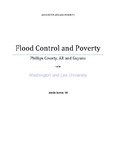Flood Control and Poverty: Phillips County, AR and Guyana

View/
Author
Seaton, Jamila M.
Subject
Washington and Lee University, Shepherd Poverty Program
Arkansas -- Phillips County
Poverty
Guyana
Floods
Infrastructure (Economics)
Flood damage prevention
Flood control -- Government policy
Metadata
Show full item recordDescription
Capstone; [FULL-TEXT FREELY AVAILABLE ONLINE] Jamila M. Seaton is a member of the Class of 2009 of Washington and Lee University. Each year global estimates of homelessness, deaths, economic loss and other effects can be analyzed. Throughout these analyses, it is clear that the most vulnerable populations are the world's poorest communities. Structurally unsound houses, lack of transportation, limited access to sufficient water supplies, and inadequate healthcare are immediate factors that create a dire situation for impoverished members of a community. In the case of a flood, these members are at greater risk of being stranded, contracting disease, suffering from lack of medical care, and ultimately death. Some data suggest that the number of people affected by flood since 1990 is growing due to a greater incidence of flooding. Some claim that floods in The United States are getting worse. Others have questioned this claim, but there is no debate that the damage caused by floods is increasing. With the rising effects of flooding, it is important that flood control become a more pressing issue in our global community, and in poverty alleviation programs. Though some effects of flooding are temporary and relatively minor, there are a host of other problems to consider, with some immediate outcomes triggering greater consequences. These seemingly minor effects also play a more crucial role in impoverished communities. Hence, the epigraph does not measure all of the devastating effects of flooding on the poor. This paper identifies the effects of flooding that contribute to the cyclic and entrapping nature of poverty in Phillips County, Arkansas and Guyana, South America, and the response that is needed from the world community. [From Introduction] Jamila Seaton